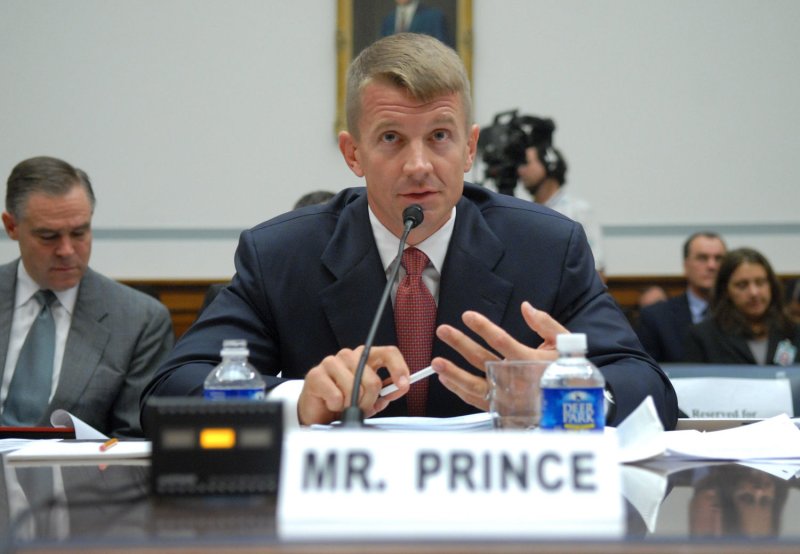Chairman of Blackwater USA Erik Prince testifies before a House Oversight and Government Reform Committee hearing on private security contracting in Iraq in Washington on October 2, 2007. (UPI Photo/Kevin Dietsch) |
License Photo
ABU DHABI, United Arab Emirates, Oct. 22 (UPI) -- U.S. security magnate Erik Prince, embattled for his role as head of the notorious Blackwater security contracting outfit that made a fortune in Iraq, is setting up shop in the United Arab Emirates.
Blackwater has been the subject of half a dozen U.S. lawsuits and prosecutions, many stemming from the activities of its personnel in Iraq. Several are linked to a September 2007 shooting central Baghdad's Nissour Square in which 17 Iraqi civilians were killed.
In April, five of the company's executives were hit with 15-count indictments on weapons and conspiracy charges.
No criminal charges have been made against Prince himself but he faces civil lawsuits brought by Iraqi victims killed or wounded by Blackwater personnel in Baghdad and elsewhere.
Blackwater's alleged links with the CIA and other U.S. government agencies could prove a challenge to any move to prosecute him. But if any do surface, the 51-year-old former U.S. Navy SEAL can fall back on the lack of any extradition agreement between the Emirates and the United States.
As Blackwater, which continues to be a significant player in U.S. operations in Afghanistan, became engulfed in scandal after scandal, Prince renamed it Xe Services. After selling off Blackwater's aviation division, Presidential Airways, early this year, he put the company, which he formed in 1997, up for sale in June.
No buyer has yet emerged. But Intelligence Online, a Paris Web site that specializes in the global security industry, reports that the logistics group Parsons Global Services and the investment fund DC Capital Partners have shown interest in Xe Service's assets.
Those assets include the 7,000-acre compound it operates at its headquarters in Moyock, N.C., with extensive training grounds.
Prince left the United States in August. Colleagues told The New York Times he had become bitter about the intense scrutiny of Blackwater over its activities in Iraq following the March 2003 U.S. invasion and the negative publicity this engendered.
"He needs a break from America," an unidentified colleague told the newspaper.
Prince has set up in Abu Dhabi, the Emirates' main source of oil. Prince will find plenty of well-established competition there.
Abu Dhabi and nearby Dubai, a major financial center in the region, have become hubs for security contractors because of the Iraq war at the northern end of the Persian Gulf.
With U.S. military forces withdrawing from Iraq, private military contractors have filled the manpower gap and are likely to go on doing so for some considerable time.
With only 50,000 U.S. troops still in Iraq, and the pullout scheduled for completion in late 2011, the U.S. State Department is expected to expand its force of security personnel to guard the massive new U.S. Embassy in Baghdad and other facilities from some 2,700 to as many as 7,000.
The security companies operating in the United Arab Emirates are also linked to the growing use of private military companies in Afghanistan, where according to a recent U.S. congressional study, more contractors are being killed than regular troops.
The study estimated there are more than 16,000 mercenaries, mostly hired by the U.S. Defense Department, currently in Afghanistan.
Intelligence Online reports that Prince "is busy working on the establishment in the Emirates of a security group capable of mounting and handling large security projects in the gulf states that would integrate both surveillance technology and protection by armed guards."
He was reported to be seeking to forge partnerships with security firms already operating in the region, many of them working with oil companies.
Intelligence Online said several firms in the Emirates have adopted the same model. Among them is Britain's Olive, which is based in Dubai's free zone and handles large-scale security projects around the gulf.















